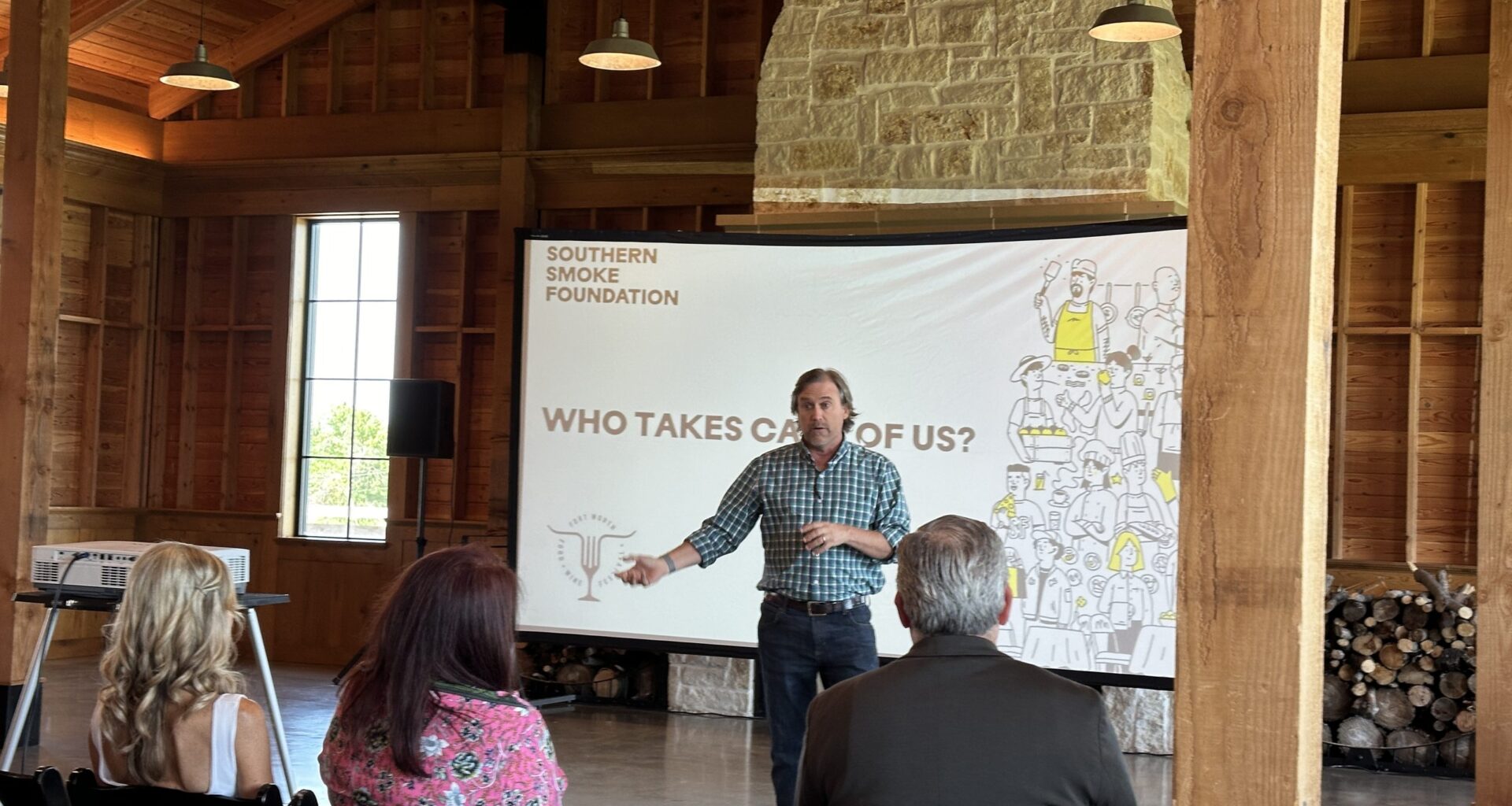Everyone in North Texas was affected by the COVID-19 lockdowns in 2020, but employees in the food and beverage industry were hit particularly hard.
With businesses closed –– some never reopening –– many bartenders, waitstaff, managers, cooks, bussers and others were left struggling to support themselves. Russell Kirkpatrick, co-founder of the Fort Worth Food + Wine Foundation and director of operations for the From Scratch Hospitality restaurant group, said restaurant and bar staff often have no safety net to fall back on during such hard times.
“Food and beverage workers are so passionate about taking care of other people,” he said, “they tend to not take care of themselves.”
That’s when the Fort Worth Food + Wine Foundation began the Restaurant Employee Emergency Relief Fund. Since debuting the service in 2020, FWFWF has provided over $100,000 to local food and beverage employees to pay their rent, cover medical and car payments, living expenses and help out in crisis situations like natural disasters and accidents.
Last year, they joined forces with the Houston-based Southern Smoke Foundation, or SSF, which provides the same services on a national level and offers no-cost mental health services through their Behind You program.
Behind You grants recipients up to 20 free in-person or telehealth counseling and therapy sessions with supervised graduate-level clinicians completing clinical hours at universities throughout the country.
In 2024, FWFWF transferred its managing operations to SSF, which Kirkpatrick said was well-established and had more experience distributing funds and services on a large scale. The Fort Worth-based foundation now focuses on collecting and redirecting donations and proceeds from its annual Fort Worth Food + Wine Festival to SSF, with a yearly $25,000 grant earmarked for Tarrant County workers.
Last year, the nonprofits distributed $25,170 across Tarrant County. The largest grant was for $7,610, according to Lindsey Brown, SSF co-founder and executive director, with average grants of $4,195. Workers who qualify for these programs include bussers, dish washers, agriculturalists and restaurant owners.
Partners in service
Once businesses reopened and restaurants resumed in-house dining, Kirkpatrick said FWFWF didn’t receive as many applications, leaving a pool of funds unused. That left the foundation wondering how to utilize the money to better serve locals.
“We wanted to find a group that did it better than us,” he said.
Southern Smoke was the answer, he said.
Brown and her husband, James Beard award-winning chef Chris Shepherd, started SSF in the 2010s after Shepherd hosted a successful fundraiser for an industry friend diagnosed with multiple sclerosis. Southern Smoke grew from there and now aids workers across the United States. They’ve distributed over $14 million since 2017 and responded to six natural disasters last year.
Despite being a Texas-based organization with national reach, SSF and Behind You aren’t well-known in Tarrant County, Kirkpatrick said. Last year, Behind You served four Tarrant County clients through 18 counseling sessions and six people received emergency funding, according to FWFWF’s year-end report.
Applicants qualify for assistance if they work full time in the food and beverage industry and have been in the industry for at least six months. Applications require proof of financial need, such as bills, receipts or lists of expenses.
Help healing
Grief came in waves for Jason Pollard, managing partner at The Usual, when his mother unexpectedly passed in 2023. Some days were fairly tolerable, while others were mired in grief. Eventually, he said he couldn’t take it anymore.
“I found myself sitting on my front porch just sobbing,” he said, “and I realized ‘I need help.’”
He said he quickly thought of Behind You. He had heard about it through social media and decided to apply. He was accepted about a week later and was paired with a counselor through the University of Houston.
“My therapist and I clicked right off the bat,” he said.
Participants don’t have to complete all 20 sessions, but if they do and want to continue therapy, universities are contracted to offer a sliding scale pay plan to help them afford further treatment, Brown said.
Pollard said the demanding nature of food and beverage service usually wears people down over time. Unlike working in retail, where an employee’s time with customers is limited to brief transactions, he said servers, managers and bartenders have to be engaging and accommodating while enduring grueling shifts and very long hours.
“It takes its emotional toll having to go through all that,” he said.
When the stress becomes too much, bartenders and other alcohol-adjacent workers often resort to drinking, he said. Brown echoed this point and said of the hospitality workers who have gone through Behind You nationwide, bartenders top the list, followed by managers and supervisors, servers and chefs. Tarrant County’s ranking was similar, with owners placing third on the list.
In order of frequency, the top issues Behind You counselors have identified in food and beverage workers were complex post-traumatic stress disorder, anxiety and depression, work-related burnout, after-work substance abuse and relationship issues, she said. This data was seen across the board and was not specific to Tarrant County.
Asking for help and pursuing therapy can be hard for many, but Pollard said he’s seeing more of his older colleagues seeking care. He said he’s excited to see programs like Behind You taking root and is hopeful for the future of mental health awareness in his field. Everyone on staff at his bar knows about SSF, he said, so to anyone who doesn’t know where to turn for support, Pollard’s message is simple: ask at The Usual.
Erin Ratigan is a freelance journalist and writer specializing in narrative news features. You can find her on X @erinratigan.
Related
Fort Worth Report is certified by the Journalism Trust Initiative for adhering to standards for ethical journalism.
Republish This Story
Republishing is free for noncommercial entities. Commercial entities are prohibited without a licensing agreement. Contact us for details.
